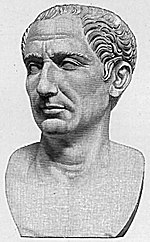Poems by Julius Caesar


Poems by Julius Caesar are mentioned by several sources in antiquity.[1] None are extant. Tacitus considered their loss a happy accident for the dictator's literary reputation:[2]
For Caesar and Brutus wrote poems, and put them in their friends' libraries too. They were no better than Cicero, but have been more lucky, for their poetry is less known.[3]
Plutarch says that verse compositions were among the entertainments Caesar offered the Cilician pirates who captured him as a young man in 75 BC.[4] Pliny places "the divine Julius" on his list of serious men who wrote not-so-serious poems.[5] Caesar's Dicta Collectanea, a collection of his memorable quotations, is assumed to have contained quotations from his verse as well as prose works.[6]
The titles of two works Caesar wrote as a young man are known, a Laudes Herculis ("Praises of Hercules") and the verse tragedy Oedipus; their planned publication by the librarian Pompeius Macer was squelched by a "short and simple" — or perhaps "curt and direct"[7] — letter from Caesar's heir Augustus as incompatible with his program of deification. A third title, Iter ("The Journey"), dates from 46 BC, composed during a 24-day trip from Rome to Spain during the civil war.[8] This verse travelogue may have been modeled after Lucilius's poem about a trip to Sicily.[9] Caesar's choice of writing as a pastime in prelude to the decisive and brutal Battle of Munda illustrates the dual preoccupations of the Late Republican aristocrat, with militarism and political power-plays balanced by elite intellectual and aesthetic aspirations.[10]
Surviving texts
A single incomplete line survives that might come from the Iter, quoted by Isidore of Seville[11] in discussing the word unguentum, "ointment":
Certain unguents, however, are referred to by place of origin. An example is telinum,[12] as Julius Caesar notes when he says 'We lubricate our bodies with soothing telinum.' This was concocted on the island of Telos, which is one of the Cyclades.
The quoted phrase corpusque suaui telino unguimus is part of a scazon or iambic trimeter.[13] Its author has also been identified as C. Iulius Caesar Strabo, the dictator's uncle.[14]
In his Life of Terence, Suetonius preserves six lines of dactylic hexameter by Caesar praising the Roman playwright, along with a more lukewarm assessment by Cicero.[15] These two verse passages, with their similarity of purpose and wording, may have resulted from a school assignment, since both men studied with the teacher and grammarian Gnipho.[16] As such, Caesar's lines are probably not to be taken too seriously as literary criticism, but his notice of Terence as "lover of a pure conversational style"[17] points toward Caesar's own stylistic predilections and linguistic nationalism.[18]
Selected bibliography
- Courtney, Edward. The Fragmentary Latin Poets. Oxford: Clarendon Press, 1993.
References
- ^ Pliny, Natural History 19.8.144; Tacitus, Dialogus de oratoribus 21; Suetonius 56; Nonius Marcellus fr. 15; Isidorus, Etymologiae 4.12.7; Firmicus Maternus, Matheseos 2. pr. 2.
- ^ Unless otherwise noted, citations of primary sources and general overview from Edward Courtney, The Fragmentary Latin Poets (Oxford: Clarendon Press, 1993), pp. 153–155 and 187–188.
- ^ Tacitus, Dialogus 21.6, English translation (including remarks on Caesar as a public speaker) by W. Hamilton Fyfe, Tacitus: Dialogus, Agricola, and Germania (Oxford: Clarendon Press, 1908), p. 22 online; Latin with notes online.
- ^ Plutarch, Life of Caesar 2, Bill Thayer's edition at LacusCurtius online.
- ^ Pliny, Epistulae 5.3.5, Latin text at The Latin Library.
- ^ Gian Biagio Conte, Latin Literature: A History (Johns Hopkins University Press, 1994), p. 226 online.
- ^ Brevis et simplex.
- ^ Suetonius, Julius Caesar 56, Bill Thayer's edition at LacusCurtius online.
- ^ Lucilius 3; Courtney, Fragmentary Latin Poets, p. 187.
- ^ Llewelyn Morgan, "Escapes from Orthodoxy: Poetry of the Late Republic," in Literature in the Roman World (Oxford University Press, 2000), pp. 336–339 online.
- ^ Isidore of Seville, Etymologiae 4.12.7, Bill Thayer's edition of the Latin text at LacusCurtius online.
- ^ "A fragrant ointment made from fenugreek": Oxford Latin Dictionary (Oxford: Clarendon Press, 1982, 1985), p. 1911.
- ^ Courtney, Fragmentary Latin Poets, p. 187.
- ^ Priscilla Throop, Isidore of Seville's Etymologies: Complete English Translation (2005), notes to XII online; William D. Sharpe, "Isidore of Seville: The Medical Writings," Transactions of the American Philosophical Society 54 (1964), p. 63 online. Michael von Albrecht takes no position on the attribution of this line, but notes that Caesar was likely influenced by his uncle; see A History of Roman Literature: From Livius Andronicus to Boethius (Brill, 1997), p. 409 online.
- ^ Suetonius, Life of Terence 7.
- ^ Courtney, Fragmentary Latin Poets, p. 155.
- ^ Puri sermonis amator.
- ^ Courtney, Fragmentary Latin Poets, pp. 153–154; Lindsay Hall, "Ratio and Romanitas in the Bellum Gallicum," in Julius Caesar as Artful Reporter: The War Commentaries as Political Instruments (Classical Press of Wales, 1998).
